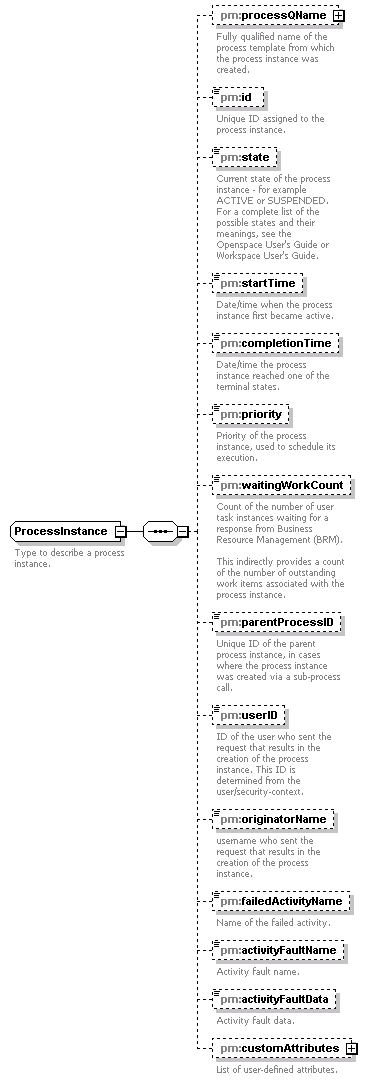| diagram |  |
||
| namespace | http://www.tibco.com/bx/2009/management/processManagerType | ||
| children | pm:processQName pm:id pm:state pm:startTime pm:completionTime pm:priority pm:waitingWorkCount pm:parentProcessID pm:userID pm:originatorName pm:failedActivityName pm:activityFaultName pm:activityFaultData pm:customAttributes | ||
| used by |
|
||
| annotation |
|
||
| source | <xsd:complexType name="ProcessInstance"> <xsd:annotation> <xsd:documentation>Type to describe a process instance.</xsd:documentation> </xsd:annotation> <xsd:sequence> <xsd:element name="processQName" type="pm:QualifiedProcessName" minOccurs="0"> <xsd:annotation> <xsd:documentation>Fully qualified name of the process template from which the process instance was created.</xsd:documentation> </xsd:annotation> </xsd:element> <xsd:element name="id" type="xsd:string" minOccurs="0"> <xsd:annotation> <xsd:documentation>Unique ID assigned to the process instance.</xsd:documentation> </xsd:annotation> </xsd:element> <xsd:element name="state" type="xsd:string" nillable="true" minOccurs="0"> <xsd:annotation> <xsd:documentation>Current state of the process instance - for example ACTIVE or SUSPENDED. For a complete list of the possible states and their meanings, see the Openspace User's Guide or Workspace User's Guide.</xsd:documentation> </xsd:annotation> </xsd:element> <xsd:element name="startTime" type="xsd:dateTime" nillable="true" minOccurs="0"> <xsd:annotation> <xsd:documentation>Date/time when the process instance first became active.</xsd:documentation> </xsd:annotation> </xsd:element> <xsd:element name="completionTime" type="xsd:dateTime" nillable="true" minOccurs="0"> <xsd:annotation> <xsd:documentation>Date/time the process instance reached one of the terminal states.</xsd:documentation> </xsd:annotation> </xsd:element> <xsd:element name="priority" type="xsd:int" nillable="true" minOccurs="0"> <xsd:annotation> <xsd:documentation>Priority of the process instance, used to schedule its execution.</xsd:documentation> </xsd:annotation> </xsd:element> <xsd:element name="waitingWorkCount" type="xsd:int" nillable="true" minOccurs="0"> <xsd:annotation> <xsd:documentation>Count of the number of user task instances waiting for a response from Business Resource Management (BRM). This indirectly provides a count of the number of outstanding work items associated with the process instance.</xsd:documentation> </xsd:annotation> </xsd:element> <xsd:element name="parentProcessID" type="xsd:string" nillable="true" minOccurs="0"> <xsd:annotation> <xsd:documentation>Unique ID of the parent process instance, in cases where the process instance was created via a sub-process call.</xsd:documentation> </xsd:annotation> </xsd:element> <xsd:element name="userID" type="xsd:string" nillable="true" minOccurs="0"> <xsd:annotation> <xsd:documentation>ID of the user who sent the request that results in the creation of the process instance. This ID is determined from the user/security-context.</xsd:documentation> </xsd:annotation> </xsd:element> <xsd:element name="originatorName" type="xsd:string" nillable="true" minOccurs="0"> <xsd:annotation> <xsd:documentation>username who sent the request that results in the creation of the process instance.</xsd:documentation> </xsd:annotation> </xsd:element> <xsd:element name="failedActivityName" type="xsd:string" nillable="true" minOccurs="0"> <xsd:annotation> <xsd:documentation>Name of the failed activity.</xsd:documentation> </xsd:annotation> </xsd:element> <xsd:element name="activityFaultName" type="xsd:string" nillable="true" minOccurs="0"> <xsd:annotation> <xsd:documentation>Activity fault name.</xsd:documentation> </xsd:annotation> </xsd:element> <xsd:element name="activityFaultData" type="xsd:string" nillable="true" minOccurs="0"> <xsd:annotation> <xsd:documentation>Activity fault data.</xsd:documentation> </xsd:annotation> </xsd:element> <xsd:element name="customAttributes" nillable="true" minOccurs="0"> <xsd:annotation> <xsd:documentation>List of user-defined attributes.</xsd:documentation> </xsd:annotation> <xsd:complexType> <xsd:sequence> <xsd:element name="customAttribute" type="pm:NameValuePair" minOccurs="0" maxOccurs="unbounded"> <xsd:annotation> <xsd:documentation>Attribute definitions.</xsd:documentation> </xsd:annotation> </xsd:element> </xsd:sequence> </xsd:complexType> </xsd:element> </xsd:sequence> </xsd:complexType> |
WSDL documentation generated by XMLSpy WSDL Editor http://www.altova.com/xmlspy